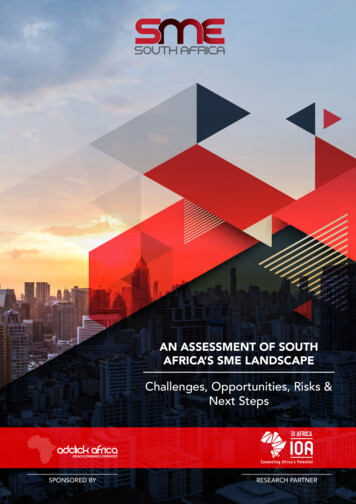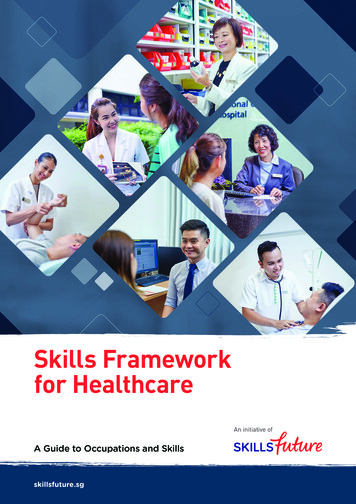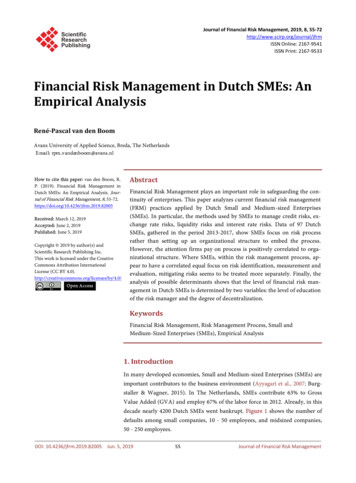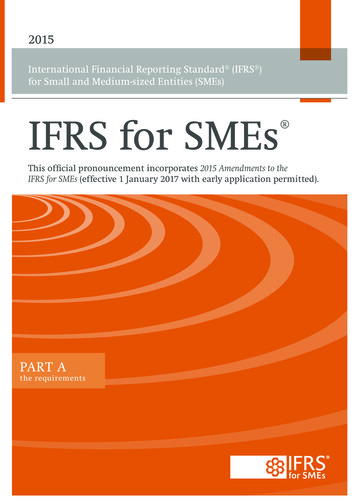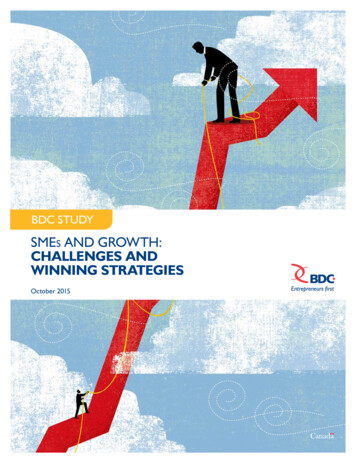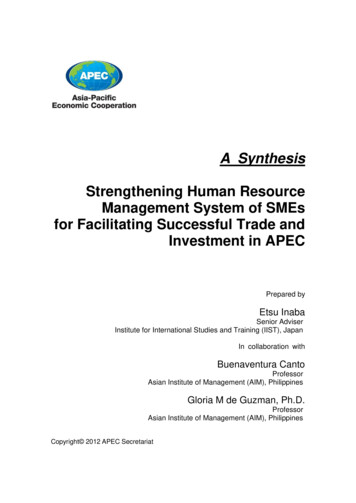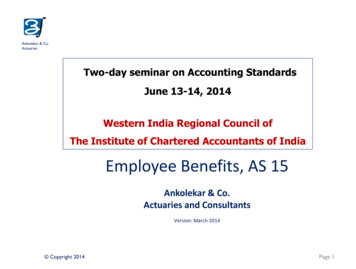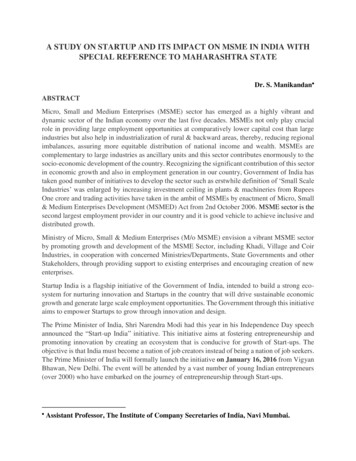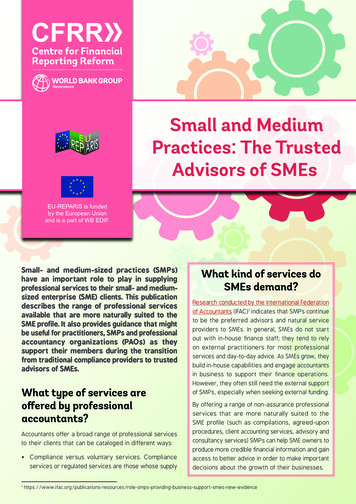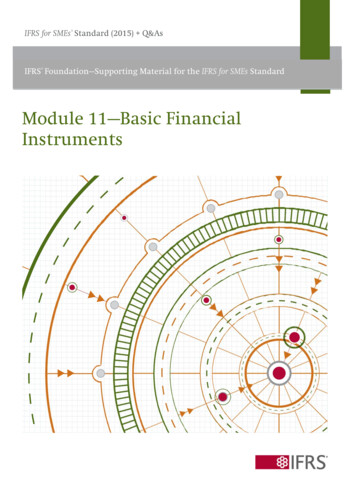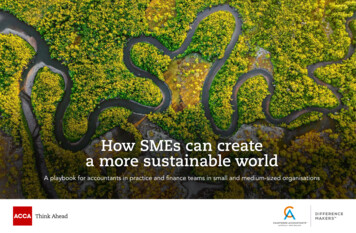
Transcription
HowSMEscancreateThe Business Data Insights Playbooka more sustainable worldHow to give your accountancy practice a competitive advantage with data and insightsA playbook for accountants in practice and finance teams in small and medium-sized organisations
ABOUT ACCAABOUT CA ANZACCA is the Association of Chartered Certified Accountants.We’re a thriving global community of 233,000 members and536,000 future members based in 178 countries that upholds thehighest professional and ethical values.Chartered Accountants Australia and New Zealand is aprofessional body, comprised of more than 131,000 diverse,talented and financially astute members, who use their skillsevery day to make a difference for businesses the world over.Members are known for their professional integrity, principledjudgement, financial discipline and a forward-looking approachto business which contributes to the prosperity of our nations.We believe that accountancy is a cornerstone profession ofsociety supporting both public and private sectors. That’swhy we’re committed to the development of a strong globalaccountancy profession and the many benefits that this brings tosociety and individuals.Since 1904 being a force for public good has been embeddedin our purpose. And because we’re a not-for-profit organisation,we build a sustainable global profession by re-investing oursurplus to deliver member value and develop the profession forthe next generation.Through our world-leading ACCA Qualification, we offereveryone everywhere the opportunity to experience a rewardingcareer in accountancy, finance and management. And using ourrespected research, we lead the profession by answering today’squestions to prepare us for tomorrow.www.accaglobal.comWe focus on the education and lifelong learning of ourmembers, and engage in advocacy and thought leadership inareas of public interest that impact the economy and domesticand international markets.We are a member of the International Federation ofAccountants, and are connected globally through the800,000-strong Global Accounting Alliance and CharteredAccountants Worldwide, which brings together leadinginstitutes in Australia, England and Wales, Ireland, New Zealand,Scotland and South Africa to support and promote over 320,000Chartered Accountants in more than 180 countries. We alsohave a strategic alliance with the Association of CharteredCertified Accountants. CA Catalyst is our strategic programmeto help CAs build capabilities, explore new markets, and providegreater value for themselves, their clients and communities.www.charteredaccountantsanz.comHow SMEs can create a more sustainable world2
ForewordDoing business sustainably is a catch cry for this decade.Employees and conscious consumers expect it. Investorswant to see evidence of progress towards it. Governments,having adopted ambitious sustainable development goalsfor the end of this decade, are ramping up regulation toencourage and even enforce it.Many small and medium-sized enterprises (SMEs) arechanging how they do business. They have found that byadopting sustainability initiatives, they can reduce costsand create new opportunities for growth and profitability.They also recognise this better prepares them for thefuture. Some have adopted a truly transformational strategy,placing sustainability at the heart of their purpose tomake a difference by solving some of the world’s biggestchallenges.But there’s evidence that suggests that many more SMEs,struggling from the impact of the Covid-19 pandemic, haveneither time to rethink and reshape their supply chainsand business models, nor financial resources to do so. Realaction on sustainability isn’t yet on their agenda.This playbook is for them. More specifically, it is for ourmembers who work as accountants and in finance teamswithin the sector and in small and medium practices (SMPs).Many of you have already helped businesses navigatea path through the pandemic. Your skills, insights andrelationships of trust with SMEs are critical.For that reason, we’re urging you now to lead initiativesin your own organisations, and for those you advise, to dobusiness sustainably. It’s the right thing to do for futureprosperity.How SMEs can create a more sustainable worldURGENT CALL TO ACTIONHelen BrandCEO, ACCAAinslie van OnselenCEO, CAANZWe’re pleased to present this playbook jointly as anintroductory resource for present and future ACCA andChartered Accountants ANZ members worldwide.It includes: actionable steps to embed sustainabilitywithin your own business ways to encourage, support and advise otherorganisations to do so too, and case studies from around the world and linksto useful tools and resources.Business as usual is no longer an option. We face a climateemergency. Sustainability is an urgent, global project.The collective impact of billions of actions at local andorganisational scale will make a huge difference. We arehere to help.We urge you to:improveÆÆyour sustainability skills andunderstandinggatherÆÆresources, start a conversationand connect more widelyconsiderÆÆsustainability in everydecision you makemeasureÆÆnon-financial performanceand encourage clients to do so tooengageÆÆwith other accounting andsustainability professionals, andshareÆÆyour insights and experiencewidely and often.3
SnapshotSmall and medium-sized businesses and accounting firms have a critical role to playin the world’s transition to a sustainable future. This playbook urges you to:RESHAPE BUSINESSMODELS ANDREIMAGINE THE FUTURERaise awareness. Prepare yourorganisation and your clients toinnovate and disrupt business asusual, mitigate and adapt to risks,and build resilience.ACT WITH URGENCYON CLIMATE CHANGEEmployees, customers andinvestors expect businessesto reduce greenhouse gasemissions in line with the ParisAgreement and the UN SDGs.INSTIGATE, GUIDE ANDLEAD CHANGEStart with your own organisation.Map out who needs to be involvedand how and create relevant keyperformance indicators (KPIs) andkey risk indicators (KRIs).How SMEs can create a more sustainable worldIDENTIFY OTHERCRITICAL AREAS FORACTIONADOPT SUSTAINABLEGOALSConsume fewer resources, promotehuman rights, diversity andinclusion, protect and regeneratethe natural environment. Contributeto reducing poverty and inequality.COLLABORATE WITHOTHERSConnect with a diverse range oforganisations tackling sustainability,and achieve more by collaboratingwith them in ways you may nothave considered.Create ambitious strategies tocreate sustainable future growth.It makes good business sense. It’salso the ethical and communityminded thing to do.BRING INTEGRITY TOTHE PROCESSWith unique skills, insights andknowledge of reporting practices,accountants and finance teamscan bring integrity to sustainabletransformation.4
An introductionIntroduction tosustainabilityThe world must make sure that no one falls short on life’sessentials, and we don’t overshoot our pressure on Earth’slife-support systems.How SMEs can create a more sustainable world5
An introduction to sustainabilitySMEs can play an important role in ensuring that humanity continues to developand thrive within the planet’s capacity.For Indigenous or First Nations people worldwide,sustainability has remained integral to social andcultural practices for millennia. In New Zealand, a Māoriproverb says: ‘Manaaki whenua, manaaki tāngata, haerewhakamua.’1 If we care for the land, if we care for people,we can move forward into the future.Rapid and widespread economic development over muchof the past century took for granted the health of criticalnatural processes, such as the regeneration of soils, cleanair, water and forests — as well as the availability of naturalresources to expand production. As a result, the world nowfaces a sustainability crisis and global climate emergency.2Priority for businessSustainability is an increasingly urgent focus for businesses,large and small. It places an organisation’s environmentaland societal impact on the same scale as financialviability. This concept of ‘triple bottom line’ accountingwas first coined in 1994, and aimed to integrate social,environmental and financial outcomes - people, planet andprofit - to evaluate sustainability.3It has evolved over time encompassing approaches such asCSR (Corporate Social Responsibility), ESG (environment,social and governance), integrated reporting, shared valueand impact investing. Now, some enterprises are called ‘forHow SMEs can create a more sustainable worldpurpose’ or ‘regenerative’ businesses. At a minimum, theseconcepts help organisations become accountable for theirimpact; at best, they serve to transform businesses to buildprosperity that is truly sustainable.Risk driversThe World Economic Forum, based on risk perceptionsurveys of more than 650 members of its leadershipcommunities, identifies the failure of effective climate actionas the biggest risk facing businesses.1.6X EARTH’S CAPACITYHumanity over-consumes naturalresources as if we lived on 1.6 Earths.4 EARTH OVERSHOOT DAYTOP 5 Risks by LikelihoodTop 5 Risks by ImpactExtreme weatherInfectious diseasesClimate action failureClimate action failureHuman environmental damageWeapons of mass destructionInfectious diseasesBiodiversity lossBiodiversity lossNatural resource crisesmarks the date when humanity’s demandfor ecological resources and services eachyear exceeds what Earth can regeneratein that year. In 2021, it fell on July 29. ForAustralia, it was March 22, New ZealandMay 15 and the UK May 19.5percentage of Earth’s land surface3% Thenow considered “ecologically intact”(Source: Frontiers in Forests and Global Change)Source: The World Economic Forum Global Risks Report 20216
An introduction to sustainability (continued)THE ESG FRAMEWORKDOUGHNUT ECONOMICSBusinesses’ approach to sustainable practices istypically framed using ESG criteria:In 2009, the Stockholm Resilience Centre broughttogether 28 scientists to identify nine processes thatregulate the stability of the Earth. They proposedquantitative boundaries within which humanity canthrive. Crossing them will increase the risk of largescale irreversible environmental change.ESGThe environmental impact of a company.Includes energy use and other resourceconsumption that impacts the naturalworld, including greenhouse gas emissions,water, waste and recycling.The social impact and interactions acompany has with employees, suppliersand customers and how its operationsaffect communities where it does business.It includes respect for human rights, suchas the eradication of modern slavery in thesupply chain, work practices, health andsafety, and diversity and inclusion.Governance refers to how an organisation,through its policies, practices andprocesses, makes decisions, complies withthe law and interacts with external parties.Oxford economist Kate Raworth further developed thisframework with her concept of Doughnut Economics,which combines the notion of planetary boundarieswith the idea of social boundaries. The name camefrom the shape of the diagram to visualise the concept.“Humanity’s 21st century challenge is to meet theneeds of all within the means of the planet,” she says.“In other words, to ensure that no one falls shorton life’s essentials (from food and housing tohealthcare and political voice), while ensuring thatcollectively we do not overshoot our pressureon Earth’s life-supporting systems, on which wefundamentally depend – such as a stable climate,fertile soils, and a protective ozone layer. TheDoughnut of social and planetary boundaries is aplayfully serious approach to framing that challenge,and it acts as a compass for human progressthis century.”SUSTAINABLE DEVELOPMENT:A DEFINITION‘Development that meets theneeds of the present withoutcompromising the ability offuture generations to meet theirown needs.’— The UN Brundtland Commission in 1987ENERGY AND FUELCONSUMPTIONPOOREST 10%187xmore thanthe poorest200xmore thanthe poorestWEALTHIEST 10%FuelHow SMEs can create a more sustainable worldEnergySource: Liverpool University7
An Introduction to sustainability (continued)The universe of sustainability issuesThe Sustainability AccountingStandards Board (SASB) hasdeveloped standards to “guidethe disclosure of financiallymaterial sustainabilityinformation by companies totheir investors.”The standards identify whichof 26 issues are most relevantto each of 77 industries. SASBStandards are now maintainedunder the auspices of the ValueReporting Foundation.In order to create value, focuson sustainability topics thatalign with your business’purpose and strategy. Ratherthan identifying and measuringKPIs straight away, reflect onwhat is truly important foryour business, and why. Thendevelop a strategy definingactions and targets andproduce meaningful KPIs.SOCIAL CAPITALENVIRONMENT Human rights & communityrelations Greenhouse gas emissions Customer privacy Energy management Data security Water & waste watermanagement Access & affordability Product quality & safety Customer welfare Selling practices & productlabellingLEADERSHIP &GOVERNANCE Business ethics Competitive behaviour Management of the legal ®ulatory environment Air qualityUNIVERSE OFSUSTAINABILITYISSUES Waste & hazardous materialsmanagement Ecological impactsHUMAN CAPITALBUSINESS MODEL& INNOVATION Product design & life cyclemanagement Labor practices Employee health & safety Employee engagement,diversity & inclusion Business model resilience Critical incident risk management Supply chain management Systemic risk management Materials sourcing & efficiency Physical impacts of climate changeSource: Sustainability Accounting Standards Board (SASB), which has since merged to create the Value Reporting FoundationHow SMEs can create a more sustainable world8
An introduction to sustainability (continued)The 2030 SustainableDevelopment GoalsLE A RN M ORE A global lens for people, planet, prosperity, peace and partnershipFor SMEs seeking to become sustainable,the 2030 Sustainable Development Goalsadopted by the United Nations in 2015form one of the most comprehensivestatements of intent ever made by theworld community.‘It is a roadmap to endingglobal poverty, building a lifeof dignity for all and leaving noone behind. It is also a clarioncall to work in partnershipand intensify efforts to shareprosperity, empower people’slivelihoods, ensure peace andheal our planet for the benefitof this and future generations.’Former UN Secretary-General Ban Ki-moonHow SMEs can create a more sustainable world9
SPOTLIGHT: WE AccountingAdvising purpose-driven Māori and Pasifika clientsWE Accounting grew from scratch a decade ago, takingon a range of business clients. Founders Wyndi andEli Tagi’s own cultural heritage — Wyndi is Māori (AtiHau-Nui-A-Paparangi), and Eli is Samoan — attracted agrowing number of clients from the Māori and Pasifikacommunities in Aotearoa (New Zealand).“Five years ago, we realised that what differentiated usas a firm was our culture,” says Eli Tagi CA. “And sincewe outright made that our point of difference, we’veseen a lot of new clients come on board who fit ourtarget market. Our client base has gone from about40% indigenous to about 70% now.”cultural context has enabled them to reassure themabout integrating culture, religion and other values intotheir business.“Some of our business owners don’t even realise thatthey're purpose-driven until we talk to them, find outmore and then highlight that for them,” says WyndiTagi.“I've had a lot of clients cry in my business planningsessions because they hadn’t put two and two togetherbefore. When they feel validated, they feel like theyunderstand why they're being so drawn to what they do— it's a very beautiful thing.”Wyndi says sustainability is embedded in Māori andPasifika culture. “If you are purpose-driven, and you'vegot that vision that's bigger than you are, and you knowthat what you’re doing is right for your ancestors, foryour land and for the generations to come, then youwork harder. You do everything that you possibly canto make sure that you are successful because you justknow that it's the right thing to do — it's in your heart,it's your life.”With an office of eight employees in Auckland, and onein the capital Wellington, WE has expanded its clientbase across the country as well as to Samoa, where it’sestablished an outsourcing office with seven staff. That’sallowed the firm to flip its business model. Businessadvisory work now accounts for about 70% of revenue.“There's far more to business than just the numbers,”says Wyndi Tagi. “We've really focused on companyculture. So, we're able to work properly with businessowners to help them understand who they are asindividuals, what they bring to the business and howtheir business really is them.”The firm’s founders say understanding their clients’How SMEs can create a more sustainable world10
The role of SMEsSMEs form a major part of the world’s economy andemployment, and have a critical role to play in the transitionto a sustainable and prosperous future.How SMEs can create a more sustainable world11
The role of SMEsHow small or medium-sized businesses are defined varies, but collectivelythey play a major role in every country and in the global economy.SMEs, which include small and mediumsized accounting practices (SMPs), play acentral role in every aspect of achieving theSustainable Development Goals (SDGs) ofthe United Nations.Small businesses make markets work. Theiroperations are critical to employment, foodproduction and distribution, construction,health and wellbeing and the delivery ofcritical services. Collectively, they have amajor economic impact.As trusted advisers to SMEs, accountantssupport this pillar of the economy already,through enhanced business support andaccess to finance.Size and scopeSmall businesses typically have 5–19employees, and medium-sized 20–199employees. The EU and Australia defineSMEs as independent businesses whichemploy fewer than 200 people (250people in the UK). In New Zealand, smallbusinesses have fewer than 20 employeesand medium-sized fewer than 50.7How SMEs can create a more sustainable worldSMES AND SUSTAINABILITYMany SMEs are preoccupied withsurvival and growth challengessuch as navigating globalisation,digitalisation and the changingnature of work. However, theymay find it challenging to see howsustainability could be a force forgrowth.A new survey by ACCA found thatonly 8% of SMEs had set net-zerotargets for 2050. One in four of the3,500 respondents said they felt theylacked the professional skills requiredto become sustainable.8Reasons SMEs may not be embracingsustainability include the lack of: awareness about the businesscase for becoming sustainable access to affordable financialresources information about how toimplement sustainabilityinitiatives knowledge about howsustainability initiatives affectbusiness strategy.9The SMEs in the ACCA survey saidthey would like to gain skills to reporteffectively on sustainability as wellas have access to checklists andresources.GLOBAL IMPACT90are SMEs.50for SMEs.6% of the world’s businesses% of the world’s employees work12
The role of SMEs (continued)Stages of sustainability in SMEsGlobal environmental and social challengescan only be addressed appropriately withthe small business sector fully involved.An SMEs approach to sustainability fits withone of these four stages, representing theshift that is taking place as awareness andaction gathers momentum.10While many existing businesses are workingout how to move from 1 to 2 or from 2 to 3,thousands of new fast-growing startups arepositioning themselves firmly in the fourthstage from the beginning. RANSFORMATIONFocused on maximisingprofit, increasing sales andmarket share. Owners maylack awareness or regardsustainability as a burdenon business growth andmay be skeptical of theimpact or benefits from anychanges.Awareness and limitedadoption of some aspectsof sustainability, often dueto external pressure fromcustomers or employees,motivated by marketopportunity. The mainfocus is firmly on economicprosperity.Deliberately developingsustainable practicesand incorporating theseinto business processes,products and serviceswith the aim of minimisingadverse environmentalor societal impacts whilemaintaining economicprosperity.Sustainability is the mainfocus and the businesspurpose is to help resolveenvironmental, social andgovernance issues. Creatingvalue for the common goodis the main priority whileeconomic prosperity willfollow.Source: Adapted from Dyllick, T.; Muff, K. (2016) Clarifying the meaning of sustainable business: Introducing a typology from business-as-usual to true business sustainability.How SMEs can create a more sustainable world13
SPOTLIGHT: BDOSPOTLIGHT: Thrive Accountants‘The biggest transformationof modern times’Take easiest actions withlargest impactAccountants seeking to have animpact on businesses should leadby example, says Catherine Bell,manager for Global Sustainability atBDO in Perth, Australia.James Lizars ACCA has a novelapproach to sustainability to help hisclients: find the easiest thing to do,with the largest impact and just do it.“We’ve activated our ownsustainability journey,” she says.“We can't go and help our clientsunless we can walk the talk, and putour hands on our hearts and say, ‘thisis what we are doing to integratesustainability into our business.' Thepath to sustainability will be differentfor every organisation, but to speakfrom experience always helps.”BDO, which counts SMEs amongits clients, is building a learningand development program at aglobal level to ensure all employeesand partners better understandsustainability. “We need to use aHow SMEs can create a more sustainable worldsustainability lens on everything wedo,” says Bell.The firm has a SustainabilityReadiness Tool clients can useto conduct a self-assessment. AnEnergy Transition Diagnostic Toolencourages them to adopt moresustainable energy solutions andbenchmarks them against theirindustry.“We are telling clients this will be thebiggest business transformation ofmodern times, and we don't have alot of time,” says Bell.Lizars, who runs Thrive Accountantsin East Grinstead UK, has taken theMillion Tree Pledge and alreadyplanted 30,000 trees directly, andthrough his clients 35,000 more. Hisfirm is part of B1G1, a global givingmovement that for every self-setmilestone a business reaches, theygive to a project elsewhere in theworld.“My favourite project is based onmicro loans,” he says. “Every timewe get a new client, we give to thisproject, and they use the money tomake a loan to a female entrepreneurin Malawi. When her business issuccessful, she pays back the loanand it’s loaned out again.” That’s thekind of leverage Lizars is looking forin his sustainability projects.As well as assisting his clients tocalculate their carbon footprint,Lizars also advises them to takesimple sustainability steps, such asworking with a more sustainablebank or running their payrollalongside giving projects. TheB-Corp assessment process is alsogreat for helping clients with theirsustainability - even if they don’t wantto commit in the end.14
Sustainability:the business caseThe collective impact of SMEs adopting sustainable practiceswill contribute to solving critical global challenges.How SMEs can create a more sustainable world15
‘Moving our world to a sustainable place requiressignificant change. The entire finance communitymust come together to support each other .’Sustainability: the business case— Sarah Whale ACCA,founder of Profit Impact.Whether you’re an accountant in practice or within a business, the momentumtowards sustainable operations is gathering pace. Don’t get left behind.Sustainability initiatives present acompelling opportunity for accountantsto assist SMEs navigate their own path ofchange.SUPPLY CHAINAs larger organisations face mandatoryreporting requirements, their supply chain iscoming under increasing scrutiny. Becausemany SMEs form a significant part of largerbusinesses’ supply chains, this is a key driverfor them to become more sustainable.Demonstrating your commitment tosustainable business raises your profile andenhances your ‘social license’ to operate.Larger organisations will view your businessas a low-risk supplier, who can positivelycontribute to their supply chain, by loweringtheir carbon footprint or demonstratingproactive steps to eradicate human rightabuses.12 If SMEs aren’t acting, then theyrisk losing existing contracts/clients or theywill soon in the future.How SMEs can create a more sustainable world‘PURCHASE ORDER’VALUE CREATIONThe SDGs themselves have been describedas a “purchase order from the future”worth an estimated US 12 trillion ofmarket opportunities by 2030.13 Adoptingsustainable practices is increasingly the keyto SMEs long-term survival.Becoming more sustainable and helpingothers do the same, gives your organisationa point of difference, improves yourbrand reputation and perceived goodwill.Increasingly, consumers want brands thatreflect their own values and are seekingprogressive, environmentally and sociallyaware products or services, ones witha clearly stated purpose rather thantraditional ones.COST SAVINGSEmbracing change creates significantopportunities to reduce costs. Water andenergy efficiency initiatives and recyclingand re-using and reducing waste improveresource allocation, streamlines operationsand boosts profitability.There’s also an opportunity cost of failing toact in a timely way, which is likely to lead toa smaller market share and weaker growthas other more progressive businessesattract customers. Saving money this way isparticularly important for SMEs affected bythe pandemic.There’s a chasm between consciousconsumers demanding sustainable productsand the number of companies offeringthem. Almost half of New Zealanders saythey have switched to brands that are moresustainable.14 In another survey of 834New Zealanders, 96% felt it important thatproducts were made of material that wasrepaired, reused or recycled.15In a nationally representative survey of8,000 people in the UK, more than twothirds said they believed businesses have animportant role to play tackling societal andenvironmental issues - with homelessness,unemployment and child education ratedmost important.16 SMEs that are seen tobe tackling these issues as part of theirbusiness will win more loyal customers andimprove their brand image.TALENTFinding talent can be a challenge for SMEsin many markets. Potential employees areattracted to apply to work at, and staywith, organisations with values that alignwith theirs, have a cohesive purpose, andare willing to take a stand on social andenvironmental issues.Creating a purpose-driven business makesyour practice or business a more attractivecareer destination. It bolsters engagement,increases retention and reduces recruitmentcosts. This ensures long-term viabilitybecause it appeals to the next generationof talent. A survey of 23,000 Millennials andGen Z17 in 45 countries found that climatechange was their top concern.1816
Sustainability: the business case (continued)INVESTMENTWhen SMEs are looking to expand theytypically need capital. Investors, funds,capital markets and financial institutions areencouraging, if not requiring, companies todisclose non-financial risks and demonstratetheir commitment to more sustainablebusiness practices.Investors want companies to anticipate andmanage climate-related risks19 which willreduce operating risks and costs in the future.A survey of UK investment funds that focuson SMEs and micro enterprises found 87per cent believe the focus on ESG issueswill increase over the next 12 months with31 per cent expecting a dramatic increase inthe next year.20The annual Investor Confidence Survey byCA ANZ and released in September 2021revealed: 86% of retail investors viewed voluntarydisclosures of ESG information asimportant. 83% said their confidence insustainability information wouldincrease if it was subject to independentassurance.RESILIENCE AND INNOVATIONThe biggest risk is business as usual. SMEsneed to focus on sustainability and embedit into all decision-making. This leads tobetter risk management and strategicplanning. They’ll become more resilient,bouncing back quicker in uncertain, volatilesituations.21Accountants can position themselves tocultivate this cultural mindset by keepingbusiness owners, boards and managerswell-informed and ensuring the appropriatesystems are in place so that everyoneadheres to the same values.22Lessons SMEs learned during COVID-19can be transferred to the sustainabilityjourney. Many SMEs faced a sharp drop inrevenue and closed temporarily. They alsohad an opportunity to innovate and buildmore resilience as many pivoted to survive.A SURVEY OF SMES IN AUSTRALIA DURING COVID-19 FOUND:44%1/5changed their businessmodel to adaptembraced onlinetradingHow SMEs can create a more sustainable world42%who switchedto online trading did sopermanently 79SPOTLIGHT: Sarah Whale FCCACollaboration is key to drivingsustainability by SMPsSarah Whale FCCA is a memberof sustainavistas, a network ofprofessionals committed to creatingan impact, and she’s passionate aboutencouraging accountants to add valuethrough sustainability advisory work.“Working with others allows youto learn, avoid repeating mistakesand speed up what you are trying toachieve,” she says. “Moving our worldto a sustainable place requires theentire finance community to drive thischange.”After spending over a decade inoperational finance, Whale qualified insustainable finance at the CambridgeInstitute for Sustainability Leadershipand is a B Leader; a training programby B Lab UK to empower people whowant to lead organisations throughthe B Corps certification.She is also a founder of profit impactwhich helps SMEs measure and growtheir positive social, environmental
institutes in Australia, England and Wales, Ireland, New Zealand, Scotland and South Africa to support and promote over 320,000 Chartered Accountants in more than 180 countries. We also have a strategic alliance with the Association of Chartered Certied Accountants. CA Catalyst is our strategic programme
